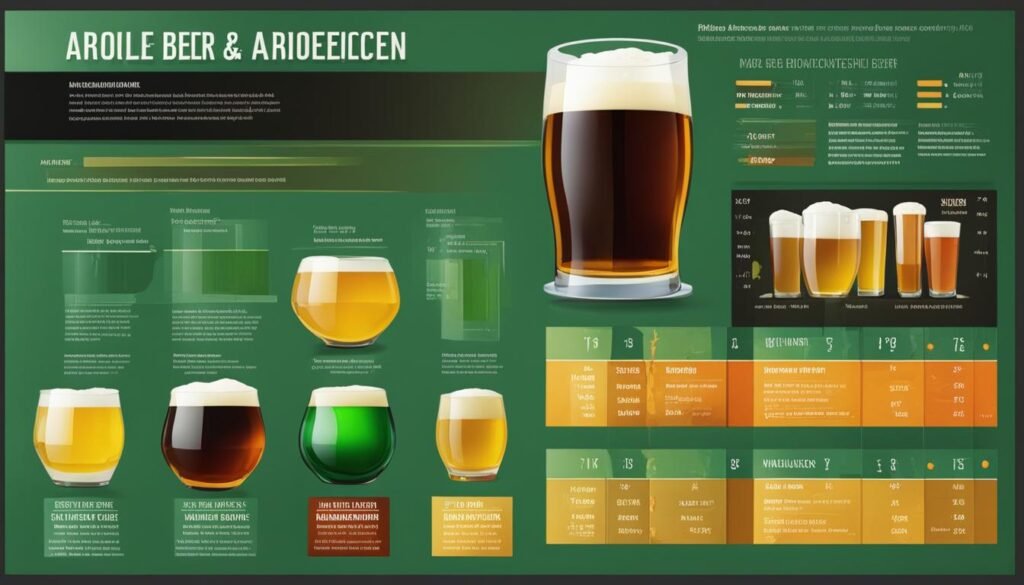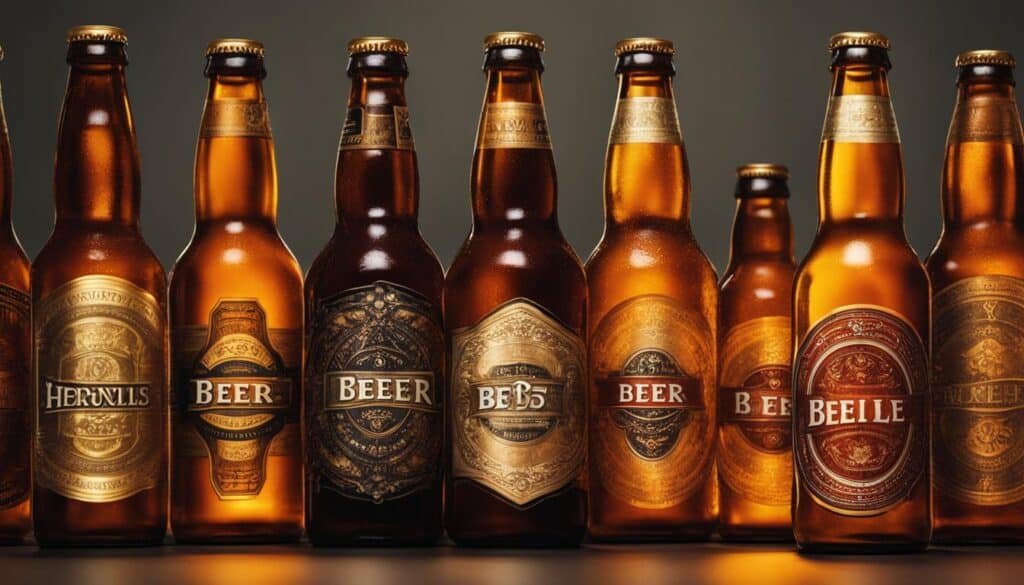Have you ever wondered if drinking 12 beers will get you drunk? It’s a question that sparks debates and curiosity among individuals. Some swear that a dozen beers will definitely leave you intoxicated, while others argue that it might not be enough. Today, we will explore the effects of consuming 12 beers and understand the factors that contribute to the buzz you may experience.
But first, let’s delve into the science behind alcohol and its impact on our bodies. Alcohol releases endorphins in the brain, leading to pleasurable feelings and intoxication. It’s these endorphins that contribute to the buzz we often seek when we consume alcoholic beverages. Additionally, the way alcohol is absorbed and metabolized in our bodies plays a significant role in determining our blood alcohol concentration (BAC) and level of intoxication.
Key Takeaways:
- Consuming 12 beers can lead to intoxication, but the level may vary among individuals.
- Alcohol releases endorphins in the brain, which contribute to pleasurable feelings and intoxication.
- Factors such as alcohol tolerance and metabolism can influence the effects of drinking 12 beers.
- It is important to drink responsibly and be aware of the potential health risks associated with excessive alcohol consumption.
The Effects of Alcohol Consumption
When it comes to consuming 12 beers, the effects can be significant due to the alcohol content. Let’s take a closer look at the various effects that alcohol consumption can have on the body and mind.
Impaired Judgment and Coordination: Consuming 12 beers can impair judgment and coordination, leading to decreased cognitive function and difficulty performing tasks that require focus and precision.
Greater Sense of Intoxication: With 12 beers in your system, you are likely to experience a heightened sense of intoxication. This can result in feeling more lightheaded, dizzy, and having an altered perception of time and space.
Release of Endorphins: Alcohol triggers the release of endorphins in the brain, leading to pleasurable feelings and a sense of relaxation. This is one of the reasons why drinking can be enjoyable for many individuals.
Metabolization and Elimination: After consuming alcohol, the liver works to metabolize it. The breakdown of alcohol produces acetaldehyde, a toxic compound that can cause hangover symptoms. Eventually, both acetaldehyde and alcohol are eliminated from the body through urine and sweat.
It’s important to note that the effects of alcohol consumption can vary depending on individual factors such as body weight, tolerance, and overall health. Additionally, mixing alcohol with other substances, such as medications, can have unpredictable and potentially dangerous effects.
Remember, responsible drinking is key to maintaining your well-being. Stay informed and make conscious choices to ensure a safe and enjoyable experience.
The Psychological Impact of Alcohol Consumption
Drinking excessively can lead to negative psychological effects, such as increased anxiety, depression, and impaired decision-making. It’s important to be mindful of your alcohol consumption and seek help if you or someone you know is struggling with substance abuse.
Understanding Alcohol Tolerance and Intoxication
Alcohol tolerance varies among individuals, influencing the level of intoxication experienced from consuming 12 beers. While some individuals may feel mildly affected, others may show more pronounced signs of intoxication. Understanding the concept of alcohol tolerance is crucial in comprehending the effects of moderate versus excessive alcohol consumption.
For heavy drinkers, the enjoyment and intoxication experienced from drinking 12 beers might be heightened due to changes in their brain chemistry. This increased pleasure can lead to a higher tolerance for alcohol, requiring larger quantities to achieve the same level of intoxication. However, it is important to note that a higher tolerance does not necessarily indicate safety or better control over alcohol consumption.
Promoting responsible drinking habits involves differentiating between moderate and excessive alcohol consumption. Moderate drinking refers to consuming alcohol in a sensible and controlled manner, while excessive alcohol consumption involves consuming alcohol in quantities that pose a risk to one’s health and overall well-being.
“Always drink responsibly and be mindful of the effects alcohol can have on your body. It’s essential to know your limits and avoid excessive alcohol consumption.”
By understanding alcohol tolerance and distinguishing between moderate and excessive alcohol consumption, individuals can make informed decisions about their alcohol intake and prioritize their well-being.
At a Glance: Moderate vs Excessive Alcohol Consumption
| Category | Moderate Alcohol Consumption | Excessive Alcohol Consumption |
|---|---|---|
| Definition | Drinking patterns within recommended limits | Drinking patterns that pose health risks |
| Quantity | Up to 1 drink per day for women Up to 2 drinks per day for men |
Drinking high quantities regularly Binge drinking (5 or more drinks in 2 hours for men or 4 or more drinks in 2 hours for women) |
| Health Risks | Lower risk of negative health consequences | Increased risk of liver disease, cardiovascular problems, addiction, and other alcohol-related conditions |

Understanding alcohol tolerance and the impact of moderate versus excessive alcohol consumption is crucial for maintaining a healthy relationship with alcohol. By being aware of one’s own tolerance levels and making responsible choices, individuals can enjoy alcohol in a safe and controlled manner.
Factors Affecting Intoxication Levels
When it comes to the effects of consuming 12 beers, several factors play a significant role in determining the level of intoxication. These factors include:
- Presence of food in the stomach: The consumption of alcohol on an empty stomach can lead to faster absorption, potentially resulting in higher blood alcohol concentration (BAC) levels and increased impairment.
- Sex: Women generally have a lower tolerance for alcohol due to differences in body composition, resulting in a higher BAC after consuming the same amount of alcohol as men.
- Weight: Body weight plays a role in alcohol metabolism. Generally, individuals with higher body weight have a higher water content and a larger distribution volume, which can mitigate the effects of alcohol consumption to some extent.
- Age: Age affects alcohol metabolism, with younger individuals typically metabolizing alcohol at a slower rate than older individuals. This can lead to higher BAC levels and increased impairment.
- Overall health: Health conditions, especially liver diseases or conditions affecting the liver’s metabolic function, can impact the body’s ability to process alcohol efficiently, leading to higher BAC levels and prolonged impairment.
- Alcohol metabolism rate: The rate at which an individual metabolizes alcohol can vary. Some people have higher levels of alcohol dehydrogenase, an enzyme responsible for breaking down alcohol, leading to faster metabolization and potentially lower BAC levels.
- Alcohol tolerance: Regular alcohol consumption can lead to the development of tolerance, where the body becomes less sensitive to the effects of alcohol. Individuals with higher alcohol tolerance may experience less impairment and lower BAC levels after consuming 12 beers compared to occasional drinkers or those with lower tolerance.
Understanding Blood Alcohol Concentration (BAC)
Blood alcohol concentration (BAC) is a measure of the amount of alcohol present in a person’s bloodstream. It is commonly used to determine the level of intoxication. BAC is influenced by the rate of alcohol absorption and metabolization, which varies among individuals and is affected by the factors mentioned above. When consuming 12 beers, BAC levels can rise significantly, leading to alcohol-induced impairment.

| Factors | Effect on Intoxication Levels |
|---|---|
| Presence of food in the stomach | Can slow down alcohol absorption and reduce the peak BAC levels. |
| Sex | Women generally experience higher BAC levels compared to men after consuming the same amount of alcohol. |
| Weight | Heavier individuals tend to have lower BAC levels compared to lighter individuals after consuming the same amount of alcohol. |
| Age | Younger individuals may have higher BAC levels due to slower alcohol metabolism. |
| Overall health | Health conditions affecting the liver’s function can result in higher BAC levels and increased impairment. |
| Alcohol metabolism rate | Individuals with faster alcohol metabolism may experience lower BAC levels and reduced impairment. |
| Alcohol tolerance | Those with higher tolerance may experience less impairment and lower BAC levels. |
Conclusion
In conclusion, the effects of drinking 12 beers can lead to intoxication and various health risks. The alcohol content in these beverages affects the brain, releasing endorphins that contribute to pleasurable feelings and a sense of intoxication.
However, it’s essential to recognize that the level of intoxication may vary among individuals due to factors such as alcohol tolerance. Heavy drinkers, for example, may experience heightened pleasure and impairments as a result of changes in their brain chemistry.
It is crucial to drink responsibly and be aware of the potential health risks associated with excessive alcohol consumption. Moderate drinking guidelines recommend up to one drink per day for women and up to two drinks per day for men. By adhering to these guidelines and understanding the effects of alcohol on our bodies, we can promote safer and more responsible drinking habits.
FAQ
Will 12 Beers Get You Drunk?
Consuming 12 beers can lead to intoxication, as the alcohol content affects the brain and releases endorphins. The level of intoxication may vary based on individual factors such as alcohol tolerance.
Can 12 Beers Make You Intoxicated?
Yes, consuming 12 beers can result in various effects due to the alcohol content. These effects may include impaired judgment, coordination, and a greater sense of intoxication.
How Many Beers Will Make You Drunk?
The number of beers needed to feel drunk varies among individuals and depends on several factors, such as body weight, alcohol tolerance, and metabolism. Consuming 12 beers can result in intoxication for many people.
Can Drinking 12 Beers Get You Buzzed?
Yes, drinking 12 beers can lead to a buzzed or intoxicated state. The alcohol content in these beers can affect the brain, releasing endorphins that contribute to pleasurable feelings and intoxication.
Is 12 Beers Enough to Get Drunk?
For most people, consuming 12 beers is enough to experience a significant level of intoxication. However, the actual level of drunkenness can vary depending on individual factors such as alcohol tolerance and the rate at which the body metabolizes alcohol.
What Are the Effects of Drinking 12 Beers?
Drinking 12 beers can result in various effects, including impaired judgment, coordination, and a greater sense of intoxication. The release of endorphins in the brain contributes to feelings of pleasure and intoxication associated with alcohol consumption.
How Does Alcohol Consumption Affect Intoxication Levels?
The consumption of alcohol affects intoxication levels by interacting with the brain and releasing endorphins. The more alcohol consumed, such as 12 beers, the higher the potential for intoxication and the associated effects on judgment and coordination.
What is the Relationship Between Alcohol Tolerance and Intoxication?
Alcohol tolerance varies among individuals, influencing the level of intoxication experienced from consuming 12 beers. Heavy drinkers may experience greater pleasure and intoxication due to changes in their brain chemistry. It is important to differentiate between moderate and excessive alcohol consumption to promote responsible drinking habits.
How Do Factors Affect Intoxication Levels?
Several factors can affect intoxication levels when consuming 12 beers or any other amount of alcohol. These factors include the presence of food in the stomach, sex, weight, age, overall health, alcohol metabolism rate, and alcohol tolerance. They contribute to the blood alcohol concentration (BAC) and the level of intoxication experienced.
What is Alcohol Absorption and Metabolization?
Alcohol absorption refers to how the body takes in alcohol through the digestive system, leading it into the bloodstream. Metabolization refers to the process by which the liver breaks down alcohol, converting it to acetaldehyde and eventually eliminating it from the body.
What is Blood Alcohol Concentration (BAC)?
Blood Alcohol Concentration (BAC) is a measure of the amount of alcohol in a person’s bloodstream. It is expressed as a percentage and is used to determine the level of alcohol-induced impairment and drunkenness.
